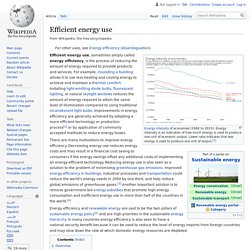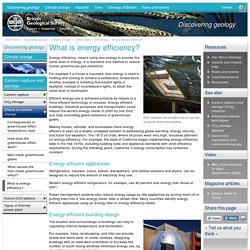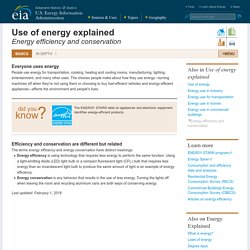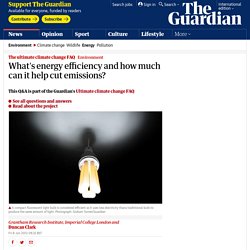

Efficient Energy Use. Energy efficiency Efficient energy use, sometimes simply called energy efficiency, is the goal to reduce the amount of energy required to provide products and services.

For example, insulating a home allows a building to use less heating and cooling energy to achieve and maintain a comfortable temperature. Installing LED lighting, fluorescent lighting, or natural skylight windows reduces the amount of energy required to attain the same level of illumination compared to using traditional incandescent light bulbs. Improvements in energy efficiency are generally achieved by adopting a more efficient technology or production process[1] or by application of commonly accepted methods to reduce energy losses. There are many motivations to improve energy efficiency. Energy efficiency and renewable energy are said to be the twin pillars of sustainable energy policy[4] and are high priorities in the sustainable energy hierarchy. Overview[edit] Other studies have emphasized this. Benefits[edit] China. What is Energy Efficiency? Energy efficiency, means using less energy to provide the same level of energy.

It is therefore one method to reduce human greenhouse gas emissions. For example if a house is insulated, less energy is used in heating and cooling to achieve a satisfactory temperature. Another example is installing fluorescent lights or skylights, instead of incandescent lights, to attain the same level of illumination. Efficient energy use is achieved primarily by means of a more efficient technology or process. Energy efficient buildings, industrial processes and transportation could reduce the world's energy needs in 2050 by one third, and help controlling global emissions of greenhouse gases. Making homes, vehicles, and businesses more energy efficient is seen as a largely untapped solution to addressing global warming, energy security, and fossil fuel depletion.
Energy-efficient appliances Modern energy efficient refrigerators, for example, use 40 percent less energy than those of 2001. Smart meters. Energy Efficiency and Conservation. Everyone uses energy People use energy for transportation, cooking, heating and cooling rooms, manufacturing, lighting, entertainment, and many other uses.

The choices people make about how they use energy—turning machines off when they're not using them or choosing to buy fuel-efficient vehicles and energy-efficient appliances—affects the environment and people's lives. The ENERGY STAR® label on appliances and electronic equipment identifies energy-efficient products. Efficiency and conservation are different but related. Business Energy Advice Program. Energy Efficiency Seen Playing Bigger Role in Future Power Usage.
25 Energy Saving Tips: How to Make Your Home More Energy Efficient. What's Energy Efficiency and How Much Can It Help Cut Emissions? Energy efficiency means using less energy to provide the same service.

For example, a compact fluorescent bulb is more efficient than a traditional incandescent bulb as it uses much less electrical energy to produce the same amount of light. Similarly, an efficient boiler takes less fuel to heat a home to a given temperature than a less efficient model. The phrase 'energy efficiency' is often used as a shorthand to describe any kind of energy-saving measure, though technically it should be distinguished from energy conservation – a broader term which can also include forgoing a service rather than changing the efficiency with which it is provided. Examples of energy conservation include turning down a thermostat in the winter or walking to the shops rather than driving there. Increasing energy efficiency often costs money up-front but in many cases this capital outlay will be paid back in the form of reduced energy costs within a short time period.
The ultimate climate change FAQ. Is Energy Efficiency Finally Reducing the Use of Electricity?